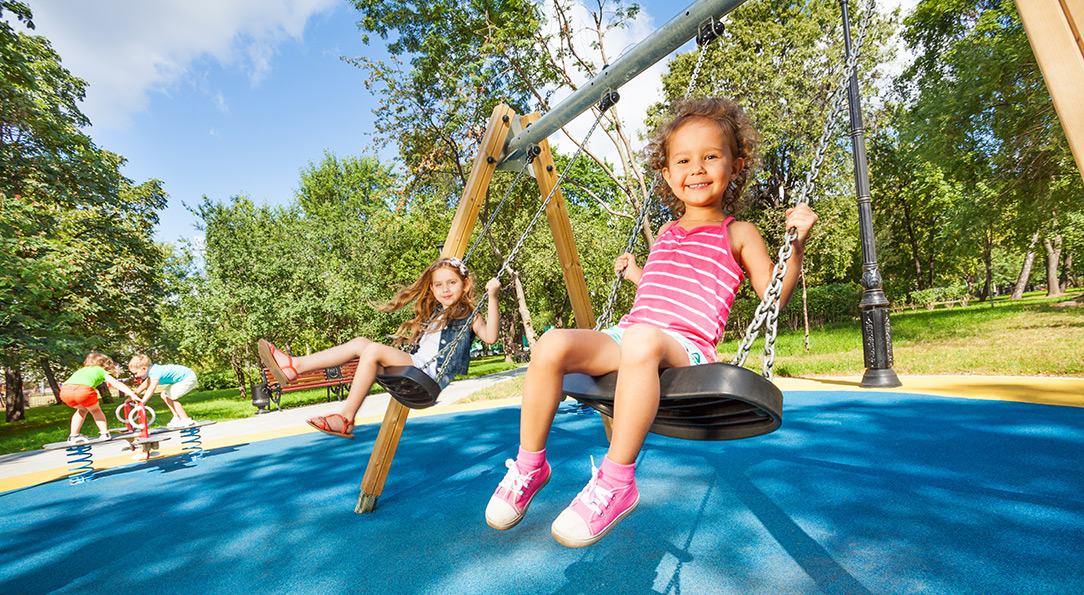It’s no doubt that play is an important part of a child’s life. In fact, many people claim that their favorite memories from their childhood include play, whether it’s playing tag with the neighbor kids or playing on the playground at recess. And while it may be obvious that this is an important part of childhood, there is so much more involved in the simple act of “play” than just providing a fun outlet for children.
A child is learning and developing when they play. It allows them to develop skills in many areas from communication and creativity, to physical and emotional health. Play provides children time to explore and discover the world around them.
An excerpt from an article from AAP (American Academy of Pediatrics) describes an interesting way to look at play from a developmental viewpoint. “Imagine if pediatricians could write a prescription to help patients during the first two years of well-child visits that would boost social, emotional, cognitive, language, and self-regulation skills. Research shows they can, and the ‘prescription’ to write is simple: Play with your kids every day.”
There are 4 main benefits of play for a child’s development: Physical, Cognitive, Social, and Emotional.
Physical Benefits
This is the most obvious benefit. Encouraging a child to play outdoors helps to create a healthy habit early in life about the importance of physical activity. This, in turn, will help reduce the risk of childhood obesity, which will impact the rest of their life. Physical play also helps kids discover how their bodies work. For example, swinging teaches a child how to balance their body, climbing teaches them about hand-eye coordination, and hanging from monkey bars strengthens hands and fingers. These are skills that seem obvious to adults, but are vital in a child’s physical development.
Cognitive Benefits
Albert Einstein once said, “Play is the highest form of research.” There are so many levels of intellectual growth that come along with play, at any age level. A baby is learning the basics of the world, textures, the concept of gravity, and colors. A toddler is learning about creativity, problem-solving skills, their attention span, and planning skills. Playing encourages a child to try something new. For example, a child might think to himself, “Wow, that slide looks so fun! But, it’s really steep and I might be scared. But, that other boy just went down and he is ok. I think I’ll try it too.” These are important skills for a child to work through on their own.
Social Benefits
When a child plays, they are learning how to interact with other people – whether friends, family, or children they are meeting for the first time. This is a skill that has a life-long impact. Playing with others increases a child’s language skills, from learning how to express their own thoughts and feelings to listening to directions of others. For example, if two children are making up a new game together, this requires a lot of focus, listening, collaboration, and compromise. Again, all skills that are needed throughout life.
Emotional Benefits
Many children need an emotional outlet, and many people don’t realize how important play is for this part of a child’s life. Something as simple as swinging can help relieve stress and help kids work through some of their anxiety and fears on their own terms. In fact, studies have shown that swinging can help impact the brain’s ability to process sensory information for children with autism. Tackling a new piece of playground equipment can increase a child’s confidence and self-esteem, and encourage them to push their limits and try other new things if their life. Playing can also provide children with better sleep, which in turn effects their behavior for the rest of the day.
No matter the circumstances, children find ways to be playful. But with the ever-growing number of screens that we have taking the place of play, it is important that we make outside play a priority and put aside excessive screen time and overly-structured activities. When kids are deprived of play, their development can be negatively influenced.
Here at SpectraTurf, we believe in the power of play and want to help provide a safe environment for children to develop the skills they need for the rest of their lives. To learn more about our playground surfacing materials, contact us.

